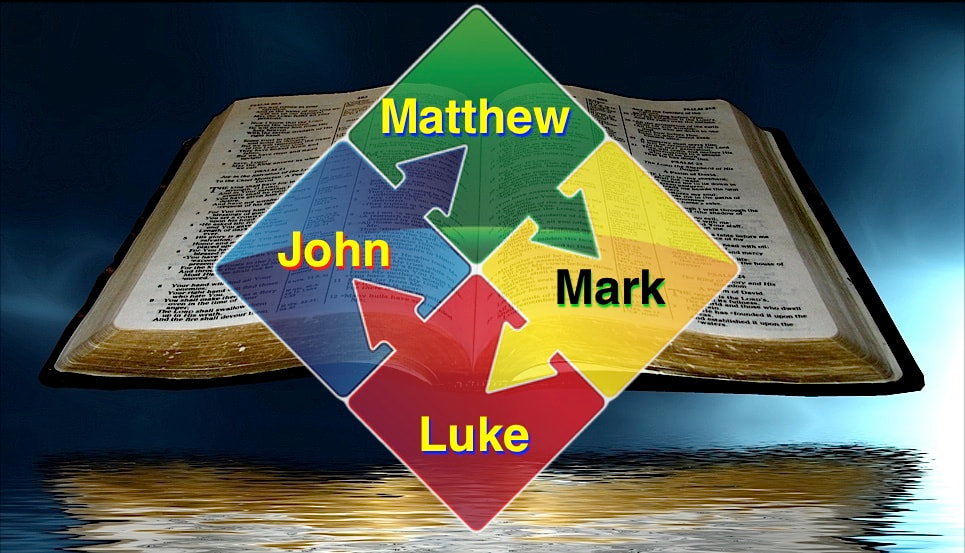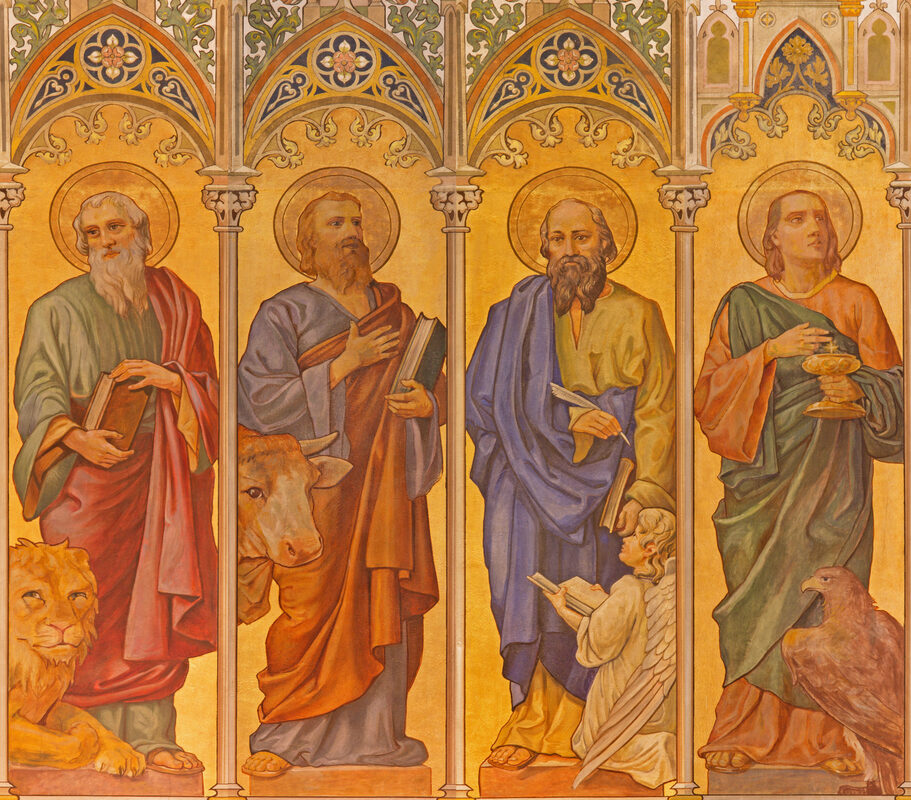MATTHEW
7
Do Not Judge
1“Judge not, that you be not judged. 2For with what judgment you judge, you will be judged; and with the measure you use, it will be measured back to you. 3And why do you look at the speck in your brother’s eye, but do not consider the plank in your own eye? 4Or how can you say to your brother, ‘Let me remove the speck from your eye’; and look, a plank is in your own eye? 5Hypocrite! First remove the plank from your own eye, and then you will see clearly to remove the speck from your brother’s eye.
6“Do not give what is holy to the dogs; nor cast your pearls before swine, lest they trample them under their feet, and turn and tear you in pieces.
Keep Asking, Seeking, Knocking
7“Ask, and it will be given to you; seek, and you will find; knock, and it will be opened to you. 8For everyone who asks receives, and he who seeks finds, and to him who knocks it will be opened. 9Or what man is there among you who, if his son asks for bread, will give him a stone? 10Or if he asks for a fish, will he give him a serpent?11If you then, being evil, know how to give good gifts to your children, how much more will your Father who is in heaven give good things to those who ask Him!12Therefore, whatever you want men to do to you, do also to them, for this is the Law and the Prophets.
The Narrow Way
13“Enter by the narrow gate; for wide is the gate and broad is the way that leads to destruction, and there are many who go in by it. 14Because narrow is the gate and difficult is the way which leads to life, and there are few who find it.
You Will Know Them by Their Fruits
15“Beware of false prophets, who come to you in sheep’s clothing, but inwardly they are ravenous wolves. 16You will know them by their fruits. Do men gather grapes from thornbushes or figs from thistles? 17Even so, every good tree bears good fruit, but a bad tree bears bad fruit. 18A good tree cannot bear bad fruit, nor can a bad tree bear good fruit. 19Every tree that does not bear good fruit is cut down and thrown into the fire. 20Therefore by their fruits you will know them.
I Never Knew You
21“Not everyone who says to Me, ‘Lord, Lord,’ shall enter the kingdom of heaven, but he who does the will of My Father in heaven. Many will say to Me in that day, ‘Lord, Lord, have we not prophesied in Your name, cast out demons in Your name, and done many wonders in Your name?’ And then I will declare to them, ‘I never knew you; depart from Me, you who practice lawlessness!’
Build on the Rock
“Therefore whoever hears these sayings of Mine, and does them, I will liken him to a wise man who built his house on the rock: and the rain descended, the floods came, and the winds blew and beat on that house; and it did not fall, for it was founded on the rock.
“But everyone who hears these sayings of Mine, and does not do them, will be like a foolish man who built his house on the sand: and the rain descended, the floods came, and the winds blew and beat on that house; and it fell. And great was its fall.”
And so it was, when Jesus had ended these sayings,
that the people were astonished at
His teaching, for
He taught them as one having authority,
and not as the scribes.
The statement
“you will know them by their fruit”
(Matthew 7:16)
is part of Jesus’ teaching about recognizing
true followers
and avoiding false prophets. Beginning with verse 15, we read this context: “Beware of the false prophets, who come to you in sheep’s clothing, but inwardly are ravenous wolves. You will know them by their fruits. Grapes are not gathered from thorn bushes nor figs from thistles, are they? So every good tree bears good fruit, but the bad tree bears bad fruit. A good tree cannot produce bad fruit, nor can a bad tree produce good fruit. Every tree that does not bear good fruit is cut down and thrown into the fire.
So then, you will know them by their fruits”
(Matthew 7:15–20).
The seventh chapter of the Gospel of Matthew
is a gold mine of teaching from the popular verse 1 to the well-known parable about the wise man building his house upon the rock (verses 24–27). In verses 21–23, Jesus makes a chilling announcement to many who assumed they belonged to Him. He warned them that on Judgment Day they will hear Him say,
“Depart from me. I never knew you.” Just before that warning,
Jesus had indicted those who pretended to follow Him
but whose lives indicated something else.
He told His followers that the “fruit” of their lives proved
what was inside their hearts
(cf. Mark 7:20–23).
When Jesus says, “You will know them by their fruit,”
what does “fruit” mean?
Jesus gave the illustration of
grape vines and fig trees
When we see grape vines, we expect them to contain grapes in season.
We also expect fig trees to produce figs.
A produce farmer who notices one of his fruit trees not bearing any
fruit will cut it down. It is useless.
Likewise, we would not come to a field of thistles and expect to harvest fruit.
Thistles and thorn bushes can never produce fruit because of their nature.
It is impossible. They have no capacity to produce anything but thorns
(Matthew 12:33).
In our lives, every word and every action is fruit from our hearts.
Sinners sin because that’s what is in their hearts.
Thieves steal, rapists attack, and adulterers cheat because those
sins are the fruit being produced from an evil heart.
Bad hearts produce bad fruit
When Jesus said, “You will know them by their fruit” concerning false teachers, He was giving us a guide for identifying them. False prophets, speakers of lies, will have actions that correspond to their errant message. Just as their message is anti-God, so will be their works. They will stray from the path of righteousness.
When we repent of our sin and receive Jesus as Lord of our lives (John 1:12; Acts 2:38), He changes our hearts (2 Corinthians 5:17). Now the fruit that is produced is good fruit. Galatians 5:22 lists some of the fruit produced by a heart in tune with God. Our attitudes, actions, words, and perspectives change as we walk in fellowship with the Holy Spirit (1 John 1:6–7). When our hearts change, our fruit changes.
Many false prophets have come and gone, and many of them lived in blatant sin while preaching their message. Jim Jones openly engaged in adultery, drug use, and profanity. David Koresh had child “wives” as young as 11. False teachers might display the “fruit” of sexual immorality, greed, materialism, gluttony, and other sins while justifying their behavior and lifting themselves up as something holy. Unfortunately, many people through the years have been duped into following such characters and joining them in justifying the sin. If only they had heeded Jesus’ warning that “you will know them by their fruit.” No matter how good or convincing someone sounds, if he is bearing bad fruit, his message should be avoided.
Godly teachers will display good “fruit” such as making disciples
(Matthew 28:19), using their gifts to benefit others (Romans 12:4–8), leading lost people to Jesus (James 5:20), loving their fellow believers (1 John 3:14), and seeking humble ways to do good everywhere (Jeremiah 29:7).
All of these things are indications of a good heart.
Often, people profess faith in Jesus as Savior, but it is a mere profession
with no real faith.
Some religious groups encourage baptism, confirmation, or other religious rites that are supposed to ensure one’s future in heaven. But as time goes on, the fruit being produced in such a life looks nothing like what is clearly prescribed in the Bible (1 Peter 1:16). Some attend church services but spend the rest of their time living entirely for themselves. Some may rise to prominence, even teaching or preaching, writing books, or dominating the media, but the fruit of their lives belies their words (Matthew 24:24). Greed, deception, immorality, pride, or dishonesty defines them, making them false prophets by Jesus’ standards (2 Peter 2:1–3).
While we can never know anyone else’s heart, we can make wise assessments about other people by observing the regular fruit of their lives. All of us stumble from time to time, and we may go through seasons of bearing little fruit (1 John 1:8). But 1 John 3:4–10makes it clear that those who know God will not continue a lifestyle of bearing bad fruit. We have been transformed, and the fruit of our lives is evidence of that transformation. Apple trees don’t produce bananas, and strawberry plants don’t produce figs. This fact of nature is also true in the spiritual realm. We can identify those whose hearts have been redeemed by the fruit we see in their lives.
6
The number 6 and its meaning is related to man
and human weakness,
the evils of the devil and the manifestation of sin. Man was created on day six of creation week. Men are appointed 6 days to labor.
A Hebrew slave had to serve 6 years before he could be released in the 7th year. Six years were appointed for the land to be sown and harvested. The number is also associated with Satan in his temptation of Jesus.
The bringing together of triple six is the mark of the end time
Beast power of Revelation.
As such, it represents the very best system of governance that mankind can produce without God and under the constant influence of his chief adversary.
Man's system on earth is made up of three parts (economic, religious and governmental) all of which are influenced and led by Satan.
When 666 is multiplied by 7 it equals 4662, which depicts man's total imperfection under Lucifer.
When added across, 4 + 6 + 6 + 2 = 18, with this total,
when divided by three, equals six.
Appearances of the Number SixJephthah (in the East) served six years as a Judge of Israel (Judges 12:7). The Bible mentions six earthquakes (Exodus 19:18, 1Kings 19:11, Amos 1:1, Matthew 27:54, 28:2, Acts 16:26).
Jesus was accused six times of being demon possessed
(Mark 3:22, John 7:20, 8:48, 8:52, 10:20 and Luke 11:15).
Number 6 and Sorcery
There are six references, in the New Testament, to people who practiced sorcery. Sorcery is defined as divination by the assistance of evil spirits.
1) In the end time, false prophets and false Christs will produce great signs and wonders (sorcery) for the expressed purpose of deception (Matthew 24:24)
2) Apostle Paul's first missionary journey takes him to the island of Cyprus (Acts 13:4 - 52, 14:1 - 25). He meets with the island's Governor who is accompanied by Elymas (also called Bar-Jesus), a man who was a false prophet and sorcerer.
3) In Samaria, a man named Simon the Sorcerer observes Philip preaching the gospel and performing a number of miracles. He feigns repentance, gets himself baptized, and then follows Philip where he sees him
perform signs and wonders.
Simon sees when Peter and John come to the city, that when they lay hands on people they receive God's Holy Spirit.
Simon soon approaches the two apostles and
tries to BUY the ability to give the Holy Spirit
so that he
can further promote his deceptions
(Acts 8).
4) While visiting Philippi during his second missionary journey, the apostle Paul runs into a slave woman "possessed with a spirit of divination"
(Acts 16:16).
Her masters use her soothsaying skills to make money.
5) Traveling Jewish exorcists, using various charms, incantations and so on, pretend to heal people and cast out demons (Acts 19:13).
6) The seven sons of a Jewish chief priest named Sceva try, but fail miserably, at casting out demons (Acts 19:14 - 16).
The word of God records that Christ was asked 6 (six) times, most of the time by those who were self-righteous, to produce a sign
to prove who he was and the claims he made.
1) The Pharisees demand a sign after they accuse Christ of casting out demons by the power of Satan (Matthew 12:38, Mark 8:11). Jesus' response was that the only sign that will be given is that of Jonah the prophet.
2) The Pharisees and Sadducees try to tempt Jesus by asking for a sign (Matthew 16:1).
3) The twelve disciples, on the Mount of Olives, ask Christ what will be the sign of his Second Coming and the end of the world
(Matthew 24:3, Mark 13:4).
4) Some people who saw him cast a demon out of a person ask him for a
sign from heaven (Luke 11:16).
5) After cleansing Jerusalem's temple at the start of his ministry,
some Jews who saw what Jesus did demand a sign
(John 2:18).
6) People who Christ miraculously fed ask him for a sign so that they may believe in him (John 6:30).
Many people
(primarily Jewish religious leaders),
toward the end of Jesus’ life, had come to believe
he was
guilty of some kind of crime or heinous sin.
A total of 6 people, however, are recorded as stating that he was innocent of all the charges leveled against him.
The 6 people who found Jesus innocent
were Roman Prefect of Judea Pontius Pilate (Luke 23:14), Herod (Luke 23:15), Judas (after the devil left him - Matthew 27:3), Pontius Pilate's wife (Matthew 27:19), one of the thieves on the cross near Christ's (Luke 23:41)
and a Roman Centurion who was at the crucifixion
(Luke 23:47).
7
The number 7 is the foundation of
God's word
It derives much of its meaning from being tied directly to creation. Used 735 times (54 times in Revelation alone), it symbolizes completeness and perfection (both physical and spiritual). If we include with this count how many times 'sevenfold' (6) and 'seventh' (119) are used, our total jumps to 860 references.
Did Job suffer due to self-righteousness?
According to some Jewish traditions, the creation of Adam occurred on September 26, 3760 B.C. (or the first day of Tishri, which is the seventh month on the Hebrew calendar). The word 'created' is used 7 times describing God's creative work (Genesis 1:1, 21, 27 three times; 2:3; 2:4). There are 7 days in a week and God's Sabbath is on the seventh day.
The Bible, as a whole, was originally divided into seven major divisions.
They are 1) the Law; 2) the Prophets; 3) the Writings, or Psalms; 4) the Gospels and Acts; 5) the General Epistles; 6) the Epistles of Paul; and 7) the book of Revelation. The total number of originally inspired books was forty-nine, or 7 x 7, demonstrating the absolute perfection of the Word of God.
Appearances of the number sevenThere are at least seven men in the Old Testament who are labeled "a man of God." They are Moses (Joshua 14:6), David (2Chronicles 8:14), Samuel (1Samuel 9:6, 14), Shemaiah (1Kings 12:22), Elijah (1Kings 17:18), Elisha (2Kings 5:8) and Igdaliah (Jeremiah 35:4).
In the book of Hebrews, written by the apostle Paul, he uses 7 titles to refer to Christ. The titles are 'Heir of all things' (Hebrews 1:2), 'Captain of our salvation' (2:10), 'Apostle' (3:1), 'Author of salvation' (5:9), 'Forerunner' (6:20), 'High Priest' (10:21) and the 'Author and finisher of our faith' (12:2).
In Matthew 13 Jesus is quoted as giving 7 parables (Matthew 13:3 - 9, 24 - 30, 31 - 32, 33, 44, 45 - 46, 47). Seven Psalms are ascribed to David in the New Testament (Psalm 2, 16, 32, 41, 69, 95 and 109).
In the book of Revelation, there are seven churches, seven angels to the seven churches, seven seals, seven trumpet plagues, seven thunders and the seven last plagues. The first resurrection of the dead takes place at the seventh trumpet, completing salvation for the Church.
Number seven and God's Feast Days
There are 7 annual Holy Days, beginning with Passover and ending with the Last Great Day (the day after the Feast of Tabernacles ends in the fall).
The cycle of the holy days is completed in 3 festival seasons by the seventh month of the sacred calendar: Passover and Unleavened Bread, 1st month; Pentecost, 3rd month; and Trumpets, Atonement, Tabernacles and Last Great Day, seventh month.
Jesus performed seven miracles on
God's holy Sabbath Day
(which ran from Friday sunset to Saturday sunset),
thus affirming its continued sacredness to God and necessity
in the life of the believer.
1) Jesus healed the withered hand of a man attending synagogue services
(Matthew 12:9).
2) At a Capernaum synagogue he casts out an unclean spirit that possessed a man (Mark 1:21).
3) Right after the above miracle Jesus heals Peter's wife's mother of a fever
(Mark 1:29).
4) A woman attending synagogue, who was made sick by a demon for eighteen years, is released from her bondage (Luke 13:11).
5) At a Pharisee's house eating a meal with the host and several lawyers, Jesus heals a man with dropsy (Luke 14:2).
6) A man who is disabled and unable to walk is healed at the pool of Bethesda (John 5:8 - 9).
7) Jesus heals a man born blind at the pool of Siloam (John 9:14).




 RSS Feed
RSS Feed
























































